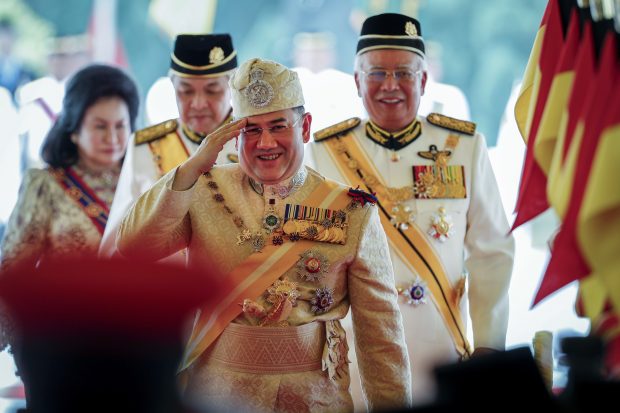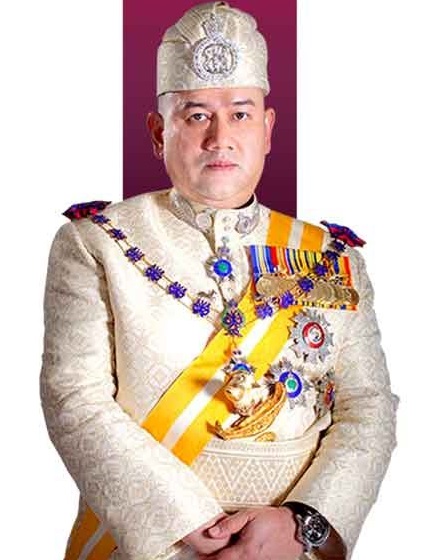Constitutional Monarchy’s Duet with Parliamentary Democracy

Sultan Muhammad V, center, salutes after his welcome ceremony as he walks with Malaysian Prime Minister Najib Razak, right, at the Parliament House in Kuala Lumpur, Malaysia, Tuesday, Dec. 13, 2016. Sultan Muhammad V of Kelantan will serve a five-year term as King of Malaysia from Tuesday. (AP Photo/Vincent Thian)
The Sultan of Kelantan, Sultan Muhammad V, 47, is now the 15th Yang di-Pertuan Agong (King of Malaysia) and will serve for a five year term under the country’s unique rotational monarchy system.
The announcement was made by the Keeper of the Rulers’ Seal, Datuk Seri Syed Danial Syed Ahmad in a statement on October 14, at the 243th (special) Conference of Rulers held at the Istana Negara (National Palace). Meanwhile the Sultan of Perak, Sultan Nazrin Muizzuddin Shah has been appointed as the Timbalan Yang di-Pertuan Agong (Deputy King).
The reign of the previous King, Tuanku Abdul Halim Mu’adzam Shah from the state of Kedah, came to an end on December 12, 2016.
Prior to that, the Johor Monarch, Sultan Ibrahim Iskandar has turned down the offer to be the next King of Malaysia as he wanted to focus on local affairs. The decision was made to give the throne to Kelantan’s Sultan Muhammad V.
The previous monarch, Tuanku Abdul Halim, is the first to be king twice as well as the oldest king. He was the king between 1970 and 1975, when the father of Malaysia’s current Prime Minister, Datuk Seri Najib Tun Razak, was premier. He succeeded Sultan Mizan Zainal Abidin 49, who was one of Malaysia’s youngest kings.
 In the modern world, it is rather unique that Malaysia, a democratic country, still serves a Monarch (Yang di-Pertuan Agong) as its prime leader. As an independent and a democratic country, Malaysia is guarded by the Constitutional Monarchy.
In the modern world, it is rather unique that Malaysia, a democratic country, still serves a Monarch (Yang di-Pertuan Agong) as its prime leader. As an independent and a democratic country, Malaysia is guarded by the Constitutional Monarchy.
Constitutional Monarchy has become part of the country’s system of administration when the Federal Constitution recognised the post and the roles of the kings. Meanwhile, Malaysia is administered by a Parliament elected by the people.
Associate Professor, Dr. Shamrahayu A. Aziz, Senior Fellow, Centre of Syariah Studies, Law and Politics, Institute of Islamic Understanding Malaysia (IKIM) said, many people believe that a constitutional monarch can only act on the advice of the prime minister or the cabinet ministers.
“Very few know that the Constitutional Monarchy in this country has so many posts and roles, and the King could act according to his whims and not the advice of parliamentary leaders.”
“Nevertheless, some analysis made on these systems found that both Constitutional Monarchy and Parliamentary Democracy are best suited in administrating and managing Malaysia,” she said at a National Convention called “National Unity – Reminiscences of The Nation’s Struggle,” in University Technology Mara, Malaysia (UiTM) recently.
The benefits of a Constitutional Monarchy is the legitimacy it provides to the government, as well as being a source of identity in the country.
She added that the King receives foreign ambassadors, officiates Parliamentary sessions, and confirms the appointment of a Prime Minister. The King appoints certain high ranking officials and officially promulgates all laws and decrees.
Shamrahayu also mentioned, in most parliamentary democracies with monarchs, the monarch has little to know power, but uses traditional powers to give mandate to the democratic government. She claims that there is a separation between the head of government and head of the country.
“This separation will permanently separate the government and the country, and limit the monarchy to be politically neutral. Symbolically, it would signal heads of government that there is a higher authority in the country and in the Constitution,” she reiterated.
The Constitutional Monarchy is also entrusted with certain discretionary powers. With the use of these discretionary powers, the monarch can bypass his Cabinet Ministers.
The discretionary powers may include the power to appoint or terminate a prime minister, with the support of a majority in Parliament.
Shamrahayu added that “the King has the power to dissolve the parliament or to form a new government, without a general election, with support from the Parliament.”
Even though it rarely happens, constitutional monarchs can reject the rule of law according to his whims.























































